PRINCETON, NJ -- Despite the results of the 2008 presidential election, Americans, by a 2-to-1 margin, say their political views in recent years have become more conservative rather than more liberal, 39% to 18%, with 42% saying they have not changed. While independents and Democrats most often say their views haven't changed, more members of all three major partisan groups indicate that their views have shifted to the right rather than to the left.
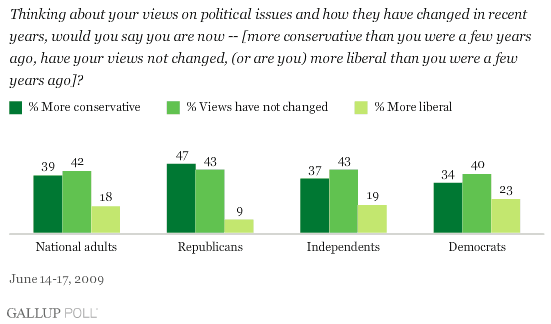
These findings, from a June 14-17 Gallup Poll, somewhat conform to Gallup's annual trends on Americans' self-defined political ideology. Thus far in 2009 (from January through May), 40% of Americans call themselves conservative, up from 37% in 2007 and 2008, and the highest level since 2004.
However, the results are conspicuously incongruous with the results of the 2008 elections, in which the Democratic Party won the White House for the first time in eight years, and increased its majority control in the U.S. House and Senate. Rather than suggesting an upturn in conservatism, the elections, the tattered image of the GOP, depressed identification with the Republican Party, and President Obama's broad popularity have many in and outside of the Republican Party wondering whether the country has outgrown the GOP's largely conservative platform.
Conservatives currently outnumber liberals in the population, and thus, conservatism has a natural advantage on any question asking the public to choose between these standard ideological labels. So that's part of the explanation for the incongruity.
Indeed, in the latest survey, 38% of Americans describe their political views as conservative, and among this group 58% say their views have grown more conservative in recent years. Although a large segment of liberals (42%) say they have become more liberal, far fewer Americans in the poll (18%) describe themselves as liberal -- thus providing little counterweight to the rightward movement of conservatives. At the same time, political moderates are twice as likely to say they have grown more conservative as opposed to more liberal (33% vs. 18%), thus further tipping the scales in favor of conservatism.
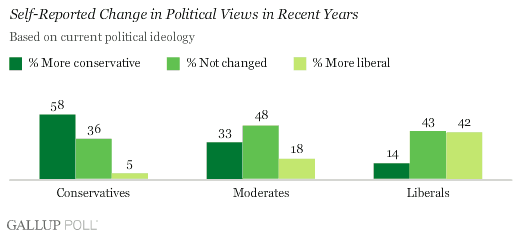
Americans' Views, Now vs. 2004
While it is valuable to know how Americans perceive their own ideological development, another means for evaluating such change is to assess how public opinion may have shifted on specific issues over the years.
Given the stark differences between the current political scene and the one surrounding the 2004 elections, 2004 represents a good comparison point for this analysis. Not only was there a five-point drop between 2004 and 2008 (from 51% to 46%) in the popular vote for the Republican presidential candidate, but there has been a similar drop (from 45% in 2004 to 40% in 2008 and 39% in 2009) in the percentage affiliating themselves with the Republican Party.
Have Americans' positions on major cultural, social, and policy issues shifted left accordingly? A broad review of the available trends suggests not. However, they have not shifted solidly right either, countering Americans' claims in the new poll that they have grown more conservative.
Major Domestic Issues
Americans' views about major domestic issues facing the country did change spanning the two most recent presidential elections, but not all of the attitudes have moved in the same direction.
Gallup polling shows Americans becoming more conservative on gun control between 2004 and 2008, with opposition to banning handguns growing from 63% to 69%. And disagreement with making gun laws "more strict" grew, from 45% to 49%.
Americans also became more likely to say the economy should be given priority over the environment when the two interests conflict -- although that may reflect the difficult economic times, rather than an ideological shift away from environmentalism.
Gallup trends show Americans growing less conservative on immigration. According to a question asking whether the level of immigration into the United States should be increased, be decreased, or stay the same, the percentage favoring decreased immigration (a traditionally more Republican/conservative stance) fell from 49% in 2004 to 39% in 2008.
Changes in public attitudes on healthcare reform have been mixed. The percentage of Americans in favor of maintaining the current healthcare system based on private insurance was 63% in 2004 but 56% in March 2009 -- a drop of seven points for the traditionally conservative healthcare position. (Support for the alternative position -- replacing the current healthcare system with a government-run system -- grew from 32% to 39%.) At the same time, Gallup saw a seven-point increase, from 34% to 41%, in views that it is not the government's responsibility to provide all Americans with healthcare coverage.
Public opinion on several other domestic policy issues did not change appreciably -- including on the death penalty and labor unions.
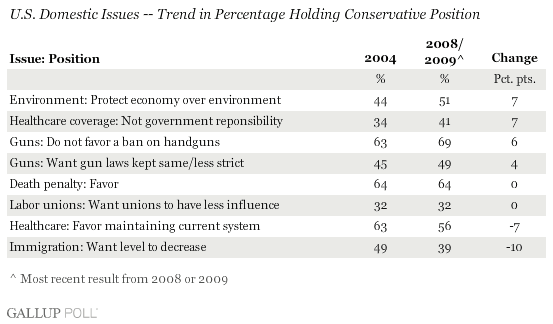
Although 32% of Americans in 2008 said they personally want unions to have less influence in the country, 35% said they want unions to have more influence -- thus, the two opposing sides on the issue now battling it out over union-organizing legislation in Congress are about equally matched.
Values-Based Issues
Of seven values issues measured in 2004 and again in 2008 or 2009, Gallup found significant movement on just two, and only one on which Americans became more liberal (the government's role in promoting traditional values).
Views on gay rights and embryonic stem-cell research are similar now to where they were at the time of the 2004 elections, despite significant policy developments on each since then. Americans seem to be moving in a slightly more conservative direction on abortion this year, with a greater percentage calling themselves pro-life than pro-choice.
Frequent churchgoers have been a bedrock Republican constituency for at least the past three presidential elections, with the majority supporting the GOP candidate in each case. Thus, a significant decline in religiosity among Americans would almost certainly be detrimental to Republican candidates. However, Gallup finds no decline since 2004 in either regular church attendance or in the percentage calling themselves "born again."
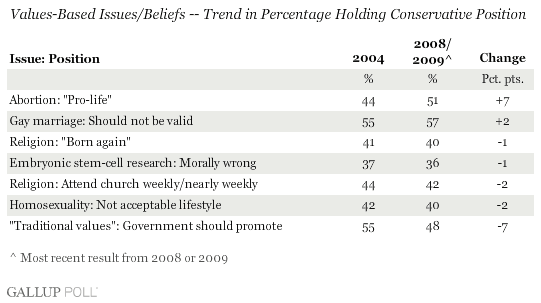
Government Power and Spending
The issues surrounding government power and spending arguably changed late in the 2008 campaign, when the banking industry crisis erupted and Wall Street arrived in Washington, D.C., asking for a major bailout. However, Gallup polling just before the financial tsunami found Americans' views about the proper role of government similar to where they stood four years previously.
The percentage of Americans saying the government "is trying to do too many things that should be left to individuals and businesses" has fluctuated in a fairly narrow range since 2004, between 47% and 55%, thus not indicating any significant shift in Americans' outlook on the role of government over this period.
The percentage saying there is "too much" government regulation of business and industry was 37% in September 2004 and 38% in September 2008 -- also essentially unchanged.
Americans' belief that taxes are too high registered 50% in April 2004 and 52% in April 2008. This dropped to 46% in April 2009, most likely a reflection of widespread approval of the overall job Obama is doing as president.
Those saying the federal government has too much power rose from 42% in September 2004 to 52% in September 2008 -- on its face a sentiment more in tune with Republican than Democratic tenets. However, much of this change occurred shortly after the 2004 elections, and was the result of increased concern about government power among Democrats.
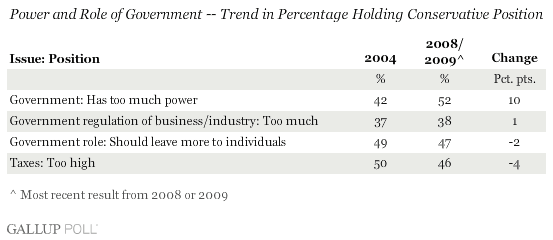
Iraq and National Defense
Gallup trends document a clear drop between 2004 and 2008 in Americans' agreement with some core elements of the Republican Party's recent national security stance. The percentage saying that sending troops to Iraq was "not a mistake" -- thus supporting President George W. Bush's original decision to launch the invasion of Iraq in 2003 -- fell from 52% in October 2004 to 39% in October 2008; however, it expanded somewhat to 43% in January 2009. And although Americans' support for U.S. involvement in Afghanistan remained high, their agreement with the decision to send troops to that country fell from 72% to 63% between July 2004 and August 2008, before recovering to 66% in January 2009.
More generally, public support for maintaining or increasing U.S. defense spending -- positions much more in tune with Bush and the Republican Party than the Democrats -- fell from 67% in February 2004 to 52% in February 2008. However, in February 2009 -- after the adoption in late 2008 of a timetable for withdrawal of U.S. troops from Iraq and with a new U.S. administration in office -- support for maintaining or increasing U.S. defense spending rebounded to 65%.
Thus on defense issues, Americans moved to the left between 2004 and 2008, reflecting public dissatisfaction with the Iraq war, but have since reverted to levels near those of 2004.
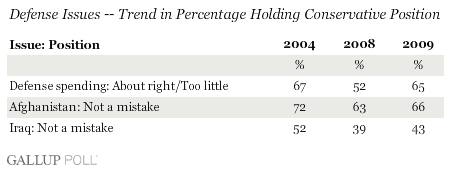
Bottom Line
Given the 2008 election returns, many are asking whether the GOP has become too conservative on the issues or whether Americans have grown more liberal. At the same time, upon the end of the 2008-2009 Supreme Court term, court watchers are noting the divergence between the liberal direction in which Obama seems to be taking the country and the conservative direction being paved by Supreme Court Chief Justice John Roberts.
Which way do Americans want to be led? While the new Gallup Poll finds the public reporting a heightened sense of conservatism in its political outlook, Americans' specific policy positions have not changed much since 2004. To the extent they have, about as many of these positions have become more liberal as more conservative.
Aside from the trends, Gallup's recent polling from 2008-2009 indicates that a majority of Americans concur with the Republican Party's general philosophy on the death penalty, defense spending, gay marriage, the role of government, environmental protection, and handgun legislation. Americans are about as likely to agree with the Republican Party's general philosophy as they are to agree with the Democratic Party's in terms of abortion, government activism, government promotion of "traditional" values, taxes, changing the power of labor unions, and certain aspects of the need for healthcare reform. They are more likely to agree with the Democratic Party's philosophy on other aspects of healthcare reform, embryonic stem-cell research, government regulation of business, the Iraq war, and immigration.
With such a mix of political leanings, then, it is understandable that Americans can approve of the job Obama is doing as president (his approval ratings remain near his term average of 63%), and simultaneously approve of the job the Supreme Court is doing (59% now approve, up from 48% a year ago).
And for those seeking to understand why the Republican Party suffered such major election losses, they may find that political ideology has very little to do with it.
Survey Methods
The most recent results are based on telephone interviews with 1,011 national adults, aged 18 and older, conducted June 14-17, 2009. For results based on the total sample of national adults, one can say with 95% confidence that the maximum margin of sampling error is ±3 percentage points.
Except as noted, results to Gallup trend questions are based on telephone surveys including interviews with approximately 1,000 national adults, aged 18 and older, and have an associated margin of sampling error of ±3 percentage points.
In addition to sampling error, question wording and practical difficulties in conducting surveys can introduce error or bias into the findings of public opinion polls.
